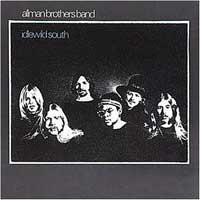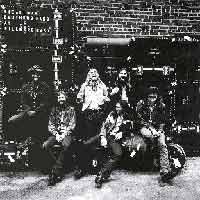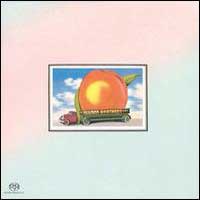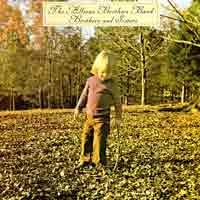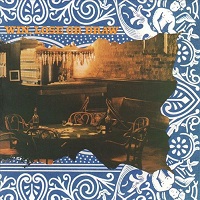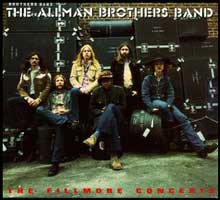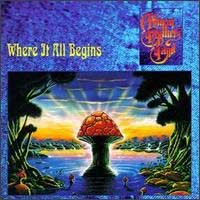Haynes scheint für die Brothers der entscheidende Zündfunke gewesen zu sein (gibt auch Gregg Allman zu), der den Allman-Big-Block wieder schön rund laufen ließ, denn er tritt hier nicht nur als Gitarrist auf, sondern schrieb einige Songs, singt ab und zu die erste Stimme und war auch mitverantwortlicher Produzent.
Das Songmaterial orientiert sich zwar an den Grenzen des ABB-Sounds, aber es ist sowohl abwechslungsreich als auch frisch, noch dazu mit hörbarer Spielfreude und reichlich Biss ("Rockin' Horse") dargebracht. Hier ist eine Band, in der zur Zeit offenbar keiner ein Drogen-, Alkohol- oder Ego-Problem hat und die sich ganz auf dieses Album konzentrieren konnte.
Wie gesagt, die eine oder andere Gitarrenfigur erinnert an Duane/Dickey, gerade wenn sich Wayne/Derek bei dem an "Sweet Melissa" erinnernden "Desdemona" in den Jam-Teil des 9-MinĂĽters eingrooven, aber das ist eher eine Verbeugung vor den beiden als eine Kopie. Feist groovenden Blues gibt es mit der Freddy King Nummer "Woman Across the River", superb akustisch wird es bei "Old Before My Time", "Heart Of Stone" der Stones bekommt ein Slow-Blues-Arrangement verpasst und immer wieder gibt es genug Raum für gnadenlos gute Gitarrenduelle, wie man sie im Southern-Rock eine Ewigkeit nicht mehr gehört hat. Das 12-minĂĽtige, treffend betitelte "Instrumental Illness" sei stellvertretend genannt. Auch auf den letzten paar ABB-Scheiben gab es längere Jams, aber man höre sich das hier vergleichsweise mal an, hier ist kein langsam verwesender Southern-Korpus am Werk, das lebt und kickt Ass! Zum Spass -um es noch einmal zu erwähnen- trägt die Kanaltrennung der Gitarristen extrem bei. Oteil Burbridge sorgt fĂĽr souveränen Bassgroove, der von drei Trommlern unterfĂĽttert wird: den alten Kempen Jaimoe und Butch Trucks an den Drums und Marc Quinones an der Percussion. Die klopfen je nach Bedarf ganz abgezockt vor sich hin, um im nächsten Moment eine Trommelorgie sondergleichen zu veranstalten.
Natürlich wären die Allmans nichts ohne den verbliebenden Bruder Gregg. Der ist neben Warren Haynes der Hauptsongschreiber und sorgt für wohltuende Piano-Licks und elektrisierende Hammond B3-Flächen (wenn man das hört, sollte man alle anderen Keyboards verbieten). Natürlich verfügt er noch über die ziemlich beste weiße Soul/Blues-Stimme, die über die Jahre noch gereift scheint und durch den scheinbar gewachsenen Resonanzkörper nun noch mächtiger und eindruckvoller klingt als in den Frühtagen (und das war ja auch nicht wirklich schlecht).
Mit angezogener Handbremse schließt das 75-minütige (!) Album mit "Old Friend", bei dem uns eine Akustische, eine Dobro, eine elektrische Slidegitarre und ein röhrender Gregg Allman nochmal richtig den Blues geben.
Besser kann man sowas heutzutage nicht mehr machen! Respekt!
(Glitterhouse)
These southern-rock road warriors' first studio album since 1994 is surprisingly solid: Returning guitarist Warren Haynes -- the best axman to pass through the band since Duane Allman -- plays with a steely, tensile power, while youngblood Derek Trucks (drummer Butch Trucks' nephew) counterpoints with mellower, more even-keeled lines. It's an effective restatement of the original chemistry between Duane and ex-guitarist Dickey Betts. The other pieces are in place as well: Gregg Allman's gruff, soulful vocals and cool Hammond organ, Oteil Burbridge's melodic, groove-laden bass work, and the rhythmic sizzle of three percussionists. The freewheeling "Instrumental Illness" lets the guitarists riff, climb and, well, hit the note for another dozen minutes.
(Rolling Stone US)
There have been many tales of terror, nervousness, and depression -- as well as raw excitement and anticipation -- since the Allmans went into the studio to make their first album of new material in a decade, and the band's first record ever without guitarist Dickey Betts, who wrote and sang the last of the band's true hits in the 1970s. The result weighs on the latter side of the equation -- nervousness and fear that the old-road dogs didn't have it in them to make new music are completely unfounded. Hittin' the Note is the band's finest studio outing since Brothers and Sisters over 20 years before. The level of songwriting, inspiration, and execution is more than admirable; it's downright bone-chilling in places. The Allman/Haynes collaboration "Desdemona," while centered in Southern soul and earthy blues, is a rock & roll powerhouse with glorious jazz overtones à la "In Memory of Elizabeth Reed" in the instrumental break. Haynes, whose ringing, stinging tone cuts through the mix like a fine-edged stiletto, is complemented beautifully by Derek Trucks. Trucks displays the round-toned beauty that adds warmth and dimension to the twin-guitar interplay that is very much built on the Duane Allman/Betts model, but creates shadowy chord figures that come more from jazz than blues, adding another shade to the tonal palette. But it's the sheer melodic power and soul feel that comes right through a studio soundboard that is most astonishing. It feels like the Allmans live, which is the thing they most wanted to get across. Instrumentally, the band's fiery exuberance is in abundance -- the organ-guitar duel in "Woman Across the River," which features a fine Haynes vocal, is given more thudding intensity by drummers Jaimoe and Butch Trucks and percussionist Marc Quiñones. The bass chair is held down by newcomer Oteil Burbridge, who, like Derek Trucks, adds a younger, more ambitious feel to the rootsy sound of the brothers, with his popped and thumped bass lines that pay often just behind the beat to add space to the framework of a given track. The sprawling "Instrumental Illness" displays the awesome guitar power that the Allmans have at their disposal, as well as their ability to improvise off cues and feelings in a way that would make some jazz musicians jealous. "Old Before My Time," a Haynes/Allman collaboration, is the most haunting song on the record. Allman sings with all the world-weariness that has truly been his lot as a road dog who has endured his share of tragedy. It begins as a folk song, with Haynes' acoustic under Allman's voice before the band enters with slide guitar; staggered in 4/4 time and littered with hand drums and a swell that transforms it into a country song of regret, remorse, and resignation, it literally stops the listener in his or her tracks. There's little time to think about the tune, however, before the spooky, dark, bluesed-out funk of "Who to Believe" comes uncoiling from the speakers like a crawling king snake from the swamp. A wonderful surprise on this set is an absolutely riveting cover of the Rolling Stones' "Heart of Stone," transformed into a rock & roll version of a Ray Price honky tonk song as if it were reinterpreted by Albert King. In sum, Hittin' the Note does exactly what its title claims -- 11 tracks' worth and it burns on every one. This album is in-the-pocket, deep-grooving Allman Brothers Band blues-rock at its best.
(by Thom Jurek, AMG)
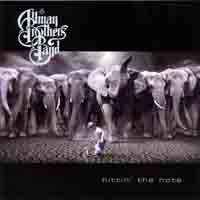
 Inselplatte #4 in Jahresliste
Inselplatte #4 in Jahresliste  Plattentipp
Plattentipp 

